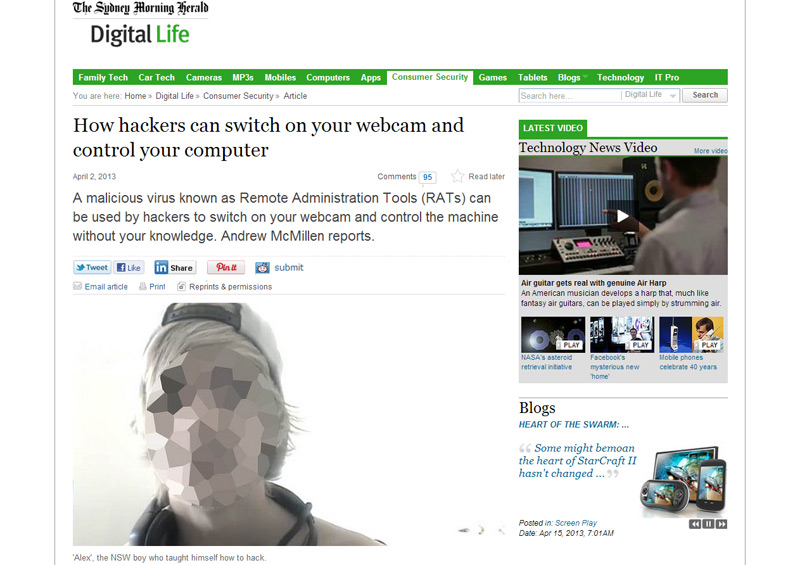Sydney Morning Herald story: ‘How hackers can switch on your webcam and control your computer’, April 2013
A feature story for smh.com.au, the website of the Sydney Morning Herald. Excerpt below.
How hackers can switch on your webcam and control your computer
A malicious virus known as Remote Administration Tools (RATs) can be used by hackers to switch on your webcam and control the machine without your knowledge. Andrew McMillen reports.
The 14-year-old couldn’t believe his eyes. The virtual currency he’d worked so hard to amass in the online role-playing game Runescape had vanished. He’d lost the equivalent of $700 in the blink of an eye, after investing his pocket money into the game’s economy for months. All that remained was an instant message dialogue box: “Haha, you got RATted!”
Sitting in his bedroom in Wauchope, on the mid-north coast of NSW, the teenager wrote back: “What does that mean?” He didn’t know at the time that his machine had been compromised by a Remote Administration Tool (RAT), an aggressive form of malware that allows hackers to access a victim’s entire computer. It was too late. The thief had disappeared. “He ran away with my money, like a girl,” laments Alex (not his real name).
Weeks later, his desolation and rage had been replaced by joy. After researching RATs and spending an entire day spreading an innocuous link using Runescape’s in-game chat function, in the hope that someone would visit the page and run the Javascript application embedded within, Alex had his mark.
Within a few clicks, the teenager had access to a stranger’s entire computer, without their knowledge. “I was the happiest kid in the whole entire world,” he says. “I could see their desktop, what they typed, the history of what they’d typed, stored passwords, files – everything.”
His victim didn’t have a webcam, so Alex wasn’t sure of their gender or their appearance, although he assumes they were male. But he knew that they played Runescape, so he got straight to work on what mattered: looting their gold, just as he’d recently experienced himself.
After emptying the stranger’s account, the teenager watched, intrigued, as his mark realised that he’d been hacked, and began trying to close the connection. Fifteen minutes later, Alex’s first “slave” – hacker shorthand for a compromised user – had disconnected himself.
The RATted had become the RATter. “I felt unstoppable,” says Alex, now 17 and studying Year 11. “I was really insecure about myself at the time. I felt like the most powerful person on Runescape.”
The senior security manager at antivirus software company Trend Micro has another name for RAT: Remote Access Trojan. “It’s a piece of software loaded onto somebody’s computer that allows it to be controlled or accessed from a third-party location,” says Adam Biviano in Sydney.
“They often arrive on a computer masquerading as something else,” he says. “Just like the mythological story, you open your gates up and you allow it inside your protected walls. All of a sudden, you think you’re getting one thing, but in reality you’re getting what they call a ‘RAT’. You’re giving access to your computer to … who knows who.”
To read the full story, visit smh.com.au.

